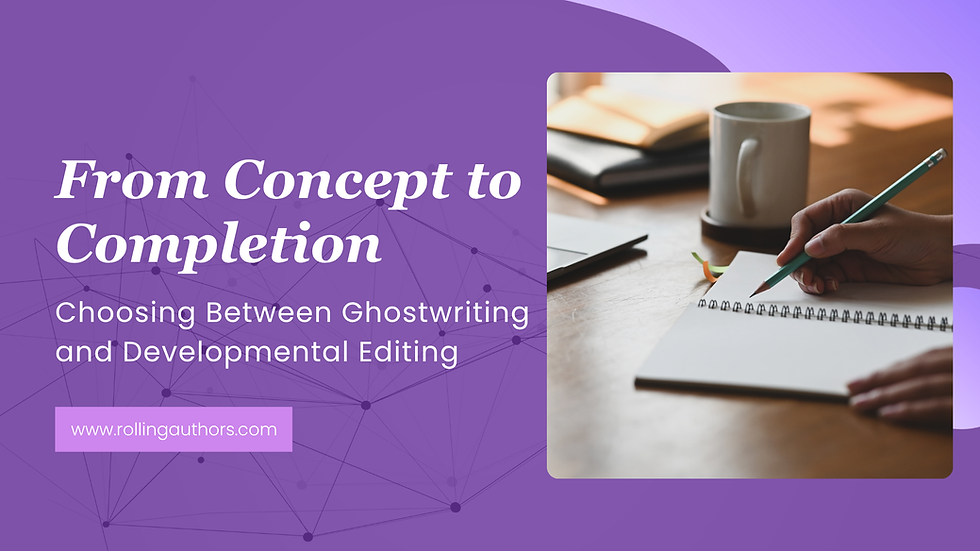Ghostwriting vs. Developmental Editing: Two Paths to a Finished Book
- Aug 11, 2025
- 4 min read

Behind every polished book today, there lies a story of how it came to be published. Such stories could range from collaborative efforts involving researchers, editors, or ghostwriters to those of raw drafts being painstakingly formatted by a developmental editor of great experience. Even an entrepreneur with a powerful story to tell, a first-time novelist, or those who have filed a number of pages but are uncertain about what's next would need assistance: likely that spell of support would involve ghostwriting or developmental editing.
So what's ghostwriting and developmental editing?
They're two ways to improve or create a book, but their purposes are different from each other—even the reason to distinguish them when looking for the proper help for your manuscript, or the lack thereof.
Let's break it down.
What is Ghostwriting? Ghostwriting is the creative partnership in which the ghostwriter writes the book for you, in your voice, based on your vision.
Imagine this: You sit with a writer who interviews you for hours-gathering your stories, your tone, your passion, and your message—and then goes off to write it: chapter by chapter, draft by draft that sounds like you, feels like you, even if you haven’t written it.
Ghostwriting is when a skilled writer takes up the work of organizing the writing: structuring your ideas, narrating them, and giving them a consistent voice. However, the ideas themselves are still yours as the author, and all the perspectives and experiences are in your hands.
Ghostwriting is an excellent choice when:
- You have an incredible tale to tell but don't have the confidence to write it.
- You are an entrepreneur or business person with no time left to actually write.
- You try writing, only to feel overwhelmed or even frustrated.
What ghostwriters do:
- Conduct interviews and research your topic thoroughly.
- Prepare a detailed outline, including aspects of the book.
- According to your tone and voice, write the manuscript.
- Share drafts at specified intervals with you for feedback.
- Revise and polish until the final version aligns with your vision.
A ghostwriter is both storyteller and translator—turning your thoughts into a narrative that resonates.
What is Developmental Editing?
Developmental editing is different because it shapes your thoughts about something you have already written down. You poured most of your thoughts onto the sheet of paper—some of them are like rough scenes and others are almost complete manuscripts—you already know that things are not as good as they should be. That is where developmental editing comes into the picture.
This type of editor will not be looking at grammar or punctuation (that comes later in line editing and proofreading). They will concentrate on issues of structure, content, and clarity of your work.
It will give you:
-Better narrative arcs.
-Stronger characters/central messages.
-Reorganising the chapters for better flow.
-Missing or unclear items.
-Rhythmic purpose within your book.
Developmental editing means having someone to support and advise your decisions, whether related to development or details. The editor is like a true coach in the development of your manuscript: guiding and helping you understand what is working and what is not working and how to refine every chapter.
Developmental editing is the best choice when:
-You've gotten vague comments like "It's good, but something's missing."
-You want storytelling or structure more tightly gripping.
-You're aspiring toward a traditional publication, and therefore need a competitive edge.
For example, you're a business leader wanting to impart years of lessons learned while building a company. You know your stories are powerful, but putting them down feels daunting. Ghostwriter would be your best choice. You talk; they write; the final draft will feel like a book from your desk.
Let's say you have written that book—but you're not sure if the chapters make sense sequentially. There is something not quite right with the introduction. Some of the anecdotes seem to lull the reader to sleep. A developmental editor would help reorder chapters, recommend what should be enriched or cut, and help refine the tone and purpose.
In both cases, the ultimate product would be a far better, incredibly marketable book. The difference is in laying them out.
Can One Use Both?
Absolutely. In fact, they are widely used by authors.
A ghostwriter completes a manuscript and then gets a developmental editor assigned to work on it for polishing. Then there are the other scenarios wherein the development editor comes in soon after the author has already started creating the document, only to realize deeper professional help is needed; Thus, the ghostwriter is called in.
These roles complement each other. Ghostwriting is the composition; developmental editing is the transformation.
Invisible Art Behind Great Books
Many a time, writing is perceived as a solitary activity: just one person with a laptop. Yet most great books are heavily collaborative. The very best of authors rely on editors. And many famous business books, autobiographies, and even novels are ghostwritten.
The main contrast is in authorship: ghostwriting—devised statements outside yourself, but it is still your story; with developmental editing, the statements are yours, with structure and focus sharpened by expert eyes.
Final Thoughts
At Rolling Authors, we accept that every author has different goals. Every writer has a unique style of drafting; even if it starts on a blank page or is trapped under piles in a rough draft, we have the right ghostwriter and editor to bring your book out into the world. Because your story matters. And how you tell it—makes all the difference.
Ready to turn your vision into a book? Reach out for a free consultation here.



Comments